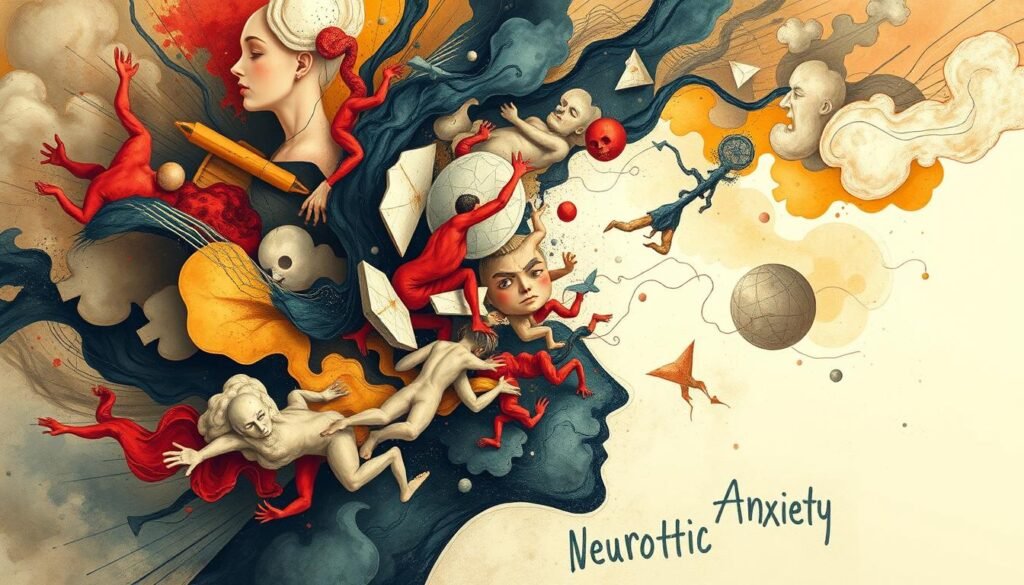Did you know that up to 40% of adults show signs of neuroticism? This trait is linked to emotional distress. Even though it was removed from the diagnostic manual in 1980, neurotic anxiety’s effects are still seen today. It brings a constant feeling of worry and unease. This makes it key for people to understand this issue deeply.
We will look into neurotic anxiety, covering what it is, its features, signs, and what causes it. You’ll also learn ways to handle this tough part of emotional distress. This knowledge aims to help make dealing with anxiety easier for everyone.
Key Takeaways
- Neurotic anxiety is often characterized by excessive worry and emotional instability.
- This personality trait may lead to difficulties in managing stress and sustaining relationships.
- Understanding the roots of neuroticism can enhance the effectiveness of treatment options.
- Healthy habits, such as exercise and journaling, can help mitigate symptoms of neurotic anxiety.
- Long-term support and cognitive-behavioral approaches are beneficial for managing neurotic behaviors.
What Is Neurotic Anxiety?
Neurotic anxiety is when a person worries and fears too much about things that may not be big threats. It is linked to many anxiety disorders, but it’s not a disorder on its own. People with this anxiety can’t stop thinking negatively, which messes up their emotions.
The word “neurotic” used to be about people with emotional problems. Sigmund Freud, a famous thinker, talked about this in 1907. He believed that unresolved inner conflicts cause neurotic anxiety. These conflicts come from unmet desires or problems not talked about. This shows how complex anxiety is when mixed with being emotionally unstable. It makes people more sensitive to stress around them.
Here’s what neurotic anxiety looks like:
- Being worried about the future all the time
- Having sudden anxiety attacks
- Fears of specific things, like open spaces or animals
Someone with neurotic behavior sees normal situations as scary. Getting upset over small things feels overwhelming. Many things cause neurotic anxiety, like our genes, our surroundings, and our childhood experiences. These experiences affect how we deal with emotions like anxiety and sadness. Neuroticism, a trait in the Big Five personality model, helps us understand these emotions.
| Neurotic Anxiety Characteristics | Description |
|---|---|
| Excessive Worrying | Always thinking bad things will happen, which makes stress worse. |
| Emotional Outbursts | Having strong emotional reactions to little things. |
| Perfectionism | Aiming too high and feeling not good enough. |
| Avoidance of Social Situations | Staying away from social events because you’re afraid of being judged or getting upset. |
Neurotic anxiety is complex and shows how intricate our minds are. It stresses the need to treat this type of anxiety in therapy. This helps improve emotional health.
Characteristics of a Neurotic Personality
A neurotic personality shows specific traits tied to our complex emotions. People with these traits often deal with frequent mood changes. They also struggle a lot with self-doubt.
For them, everyday situations can feel more threatening. This can lead to trouble managing their emotions and higher anxiety. When stress builds up, life’s challenges can seem even harder to handle.
Such individuals might often feel irritable, angry, or sad. These feelings can make it tough for them to keep stable relationships. Character analysis can show that their reactions are due to perceived threats around them. How they see these issues can make their emotional problems worse.
While neuroticism is often seen in a bad light, having some neurotic traits can be useful. These people might pay more attention to details and be careful in risky situations. They can also feel more for others going through tough times because of their deep emotional understanding.
Exercising, practicing mindfulness, and changing how one thinks can help control neurotic behavior. You can find more tips on dealing with neuroticism here.

Neurotic Anxiety Versus Normal Anxiety
Normal anxiety and neurotic anxiety are different mainly in how strong they are and how they affect life. Normal anxiety happens for a reason, making us nervous before big moments like speeches or tests. This feeling usually pushes us to do better and doesn’t last long.
Neurotic anxiety, however, is when worry takes over, affecting work, friendships, and daily tasks. People with neurotic anxiety often fear the worst in normal situations. This can make dealing with everyday challenges very hard.
The following table shows how normal and neurotic anxiety compare:
| Aspect | Normal Anxiety | Neurotic Anxiety |
|---|---|---|
| Intensity | Mild to moderate | Severe |
| Duration | Short-term | Persistent |
| Triggers | Specific situations | Generalized worries |
| Emotional Reactions | Motivating | Debilitating |
| Impact on Daily Life | Minimal interference | Significant impairment |
Understanding the key differences helps us figure out why we feel a certain way. To manage neurotic anxiety, specific approaches are needed. These methods often focus on past events and unhealthy thinking, not just current stresses.
Symptoms of Neurotic Anxiety
Neurotic anxiety can greatly lower a person’s life quality. It’s key to know these symptoms to understand people’s struggles. Neurotic anxiety has two big parts: obsessive thoughts with compulsive actions, and too much worrying with irrational fears.
Obsessive Thoughts and Compulsive Behaviors
People often get stuck on negative thoughts. These can be regrets or worries about what will happen next. These thoughts can cause a lot of stress, making everyday life hard. To cope with these tough thoughts, individuals might start doing things over and over again. This could be checking locks many times, staying away from certain places, or following rigid routines. While these actions might feel soothing at first, they can make anxiety worse. This leads to relying more on these behaviors.
Excessive Worrying and Irrational Fears
Worrying too much is a big part of neurotic anxiety. This worrying can focus on small things, taking up time and energy. It’s not just daily worries; it can also be about bigger fears, making people feel stuck. Along with worry, there are irrational fears. These fears can make people avoid places or situations. They can vary from simple to extreme, affecting how one lives.

Causes of Neurotic Anxiety
Neurotic anxiety has many causes, including genetics, environment, and childhood trauma. These factors work together, influencing how people develop anxieties. Understanding them offers insights into why some get more anxious than others.
Genetic and Environmental Influences
Genetics matter when it comes to neurotic anxiety. If your family has a history of anxiety or mood disorders, you might be more prone to them too. Things like stress, lack of friends, and societal expectations also play a big role. Together, genes and environment make some people more likely to face ongoing anxiety issues.
Impact of Childhood Experiences
What happens in childhood can shape how we deal with feelings as adults. If a person faced trauma, was neglected, or had unpredictable parents, they might struggle more with anxiety. These early issues can make anxiety responses stronger, affecting someone’s emotional health for a long time. Working through these early experiences can lessen neurotic anxiety as one gets older.

| Factors | Description |
|---|---|
| Genetic Factors | Inherited traits that increase anxiety susceptibility |
| Environmental Influences | Life stressors and social pressures contributing to anxiety |
| Childhood Trauma | Negative experiences in formative years impacting emotional health |
How Neurotic Anxiety Affects Daily Life
Neurotic anxiety deeply affects how people function daily. It impacts emotions, making it hard to handle stress and keep relationships healthy. People with this anxiety avoid things that scare them.
This leads to them staying away from social settings. As a result, they lose friends and feel lonelier. This makes their anxiety worse. In jobs, their performance drops and they feel bad about themselves. This affects many parts of life.
For those dealing with neurotic anxiety, emotions can be a rollercoaster. Some try to use their anxiety as a push for better things. But, the constant worries often win. Learning to manage this can make their lives richer. An article discusses how understanding neuroticism helps. It shows ways to manage emotions better. You can read about it here.
Strategies to Cope with Neurotic Anxiety
Dealing with neurotic anxiety takes a varied approach. It’s about finding strategies that ease its impact. People who have neurotic anxiety often struggle with too much worry, mood swings, and thoughts they can’t control. It’s crucial to weave healthy coping habits into your daily life to manage these issues.
Healthy Coping Mechanisms
Healthy coping mechanisms can make a big difference in how you feel. Useful approaches include:
- Regular exercise to reduce stress hormones and improve mood
- Balanced nutrition to support overall health
- Practicing mindfulness and meditation to enhance emotional regulation
- Cognitive Behavioral Therapy (CBT) techniques to confront and reframe negative thoughts
- Developing positive thought patterns to counteract excessive rumination
These methods don’t just help manage neurotic anxiety symptoms. They also work towards lasting emotional well-being.
The Importance of Social Support
Social support is crucial for dealing with neurotic anxiety. A strong support network can offer emotional relief and lessen the loneliness that often comes with anxiety. Talking things out with family or close friends can help lighten the anxiety load. Joining support groups or therapy sessions gives you a sense of belonging and understanding, which improves coping skills. Keeping up with relationships and sharing worries with others builds a support network that’s key in handling daily pressures.
To effectively use these coping methods, it helps to understand neurotic behaviors and what drives them. For a broad view, you might find this link quite enlightening. Being informed can help build resilience and better your emotional health.
| Coping Mechanisms | Benefits |
|---|---|
| Exercise | Reduces stress hormones, boosts mood |
| Nutrition | Supports overall health, stabilizes energy |
| Mindfulness | Enhances emotional regulation, reduces anxiety |
| Social Support | Provides emotional outlets, combats isolation |
| Cognitive Techniques | Helps reframe negative thoughts, reduces rumination |
Neurotic Anxiety and Mental Health Disorders
Neurotic anxiety often goes hand in hand with many anxiety disorders and mental health issues. People dealing with it have a higher chance of facing conditions like generalized anxiety disorder (GAD), obsessive-compulsive disorder (OCD), and depression. Although neurotic anxiety is not a mental illness on its own, it can make stress worse and lead to emotional health problems over time.
Research shows that being neurotic is strongly connected to having mental health disorders. Those who have a lot of neurotic anxiety might struggle with their emotional health and life quality. They may constantly worry, have mood swings, and act in ways that make daily life harder.
Genes can often predict who gets anxiety disorders. For example, having a family member with OCD might mean you will have similar issues, especially if these started when you were young. Stressful or traumatic life events can also make neurotic anxiety worse, affecting mental health even more.
People with neurotic anxiety might try to stay away from what scares them. Even if they know their fears don’t make sense, avoiding them can still be tough. This avoidance can lead to even more anxiety and upset. Getting checked for neurotic disorders through personality tests can help. It offers ways to handle stress and spot possible mental health risks.
Conclusion
Understanding neurotic anxiety is important whether you feel it or see it in others. Knowing its symptoms, traits, and causes helps improve well-being. By recognizing it early, one can fight anxiety with therapy or support groups.
Research shows that neuroticism impacts life, touching on relationships, job performance, and health. Dealing with it involves mindfulness, controlling negative thoughts, and getting support. People must take steps to care for their mental health.
Dealing with neurotic anxiety leads to better emotional health and stronger relationships. It enriches life. For those looking to understand their anxiety, resources like quizzes and tests are great tools. They help identify and manage anxiety effectively.